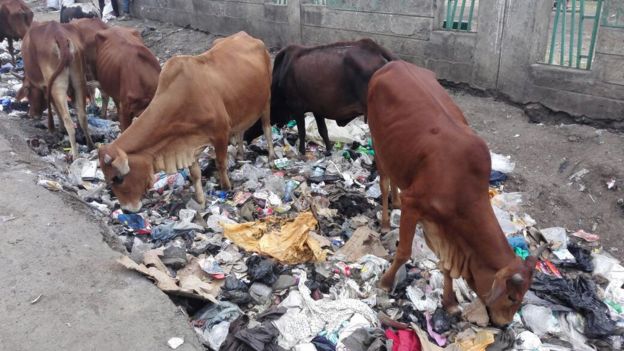A ban on plastic carrier bags has come into force in Kenya, which means that anyone found selling, manufacturing or carrying them could face fines of up to $38,000 or prison sentences of up to four years.
The government says the ban will help protect the environment.
But manufacturers of the bags have argued that 80,000 jobs could be lost.
A court on Friday rejected a challenge to the ban. Kenyans are estimated to use 24 million bags a month.
A number of other African countries have outlawed plastic carrier bags, including Rwanda, Mauritania and Eritrea.
Piles of waste plastic bags are a common site across Kenya, as in many African countries.
Animals often graze on the rubbish and the United Nations' Environment Programme says huge amounts of polythene bags are pulled out of livestock in Nairobi's abattoirs - as many as 20 bags per cow - raising fears of plastic contamination in beef.

Cows in Kenyan abattoirs are often found with plastic bags in their stomachs
Kenya's Environment Minister Judy Wakhungu says the plastic bags take between 20 and 1,000 years to biodegrade.
"Plastic bags now constitute the biggest challenge to solid waste management in Kenya. This has become our environmental nightmare that we must defeat by all means," she told the BBC.
The BBC's Anne Soy in Nairobi says that supermarkets appear to have adjusted - they are selling fabric bags for 10 Kenyan shillings (10 US cents; 7 British pence).
However, traders in the City meat market are still using plastic bags, she says.
Travellers coming into Kenya with duty-free plastic shop bags will be required to leave them at the airport under the new rules, the National Environmental and Management Authority has said.
This is the third attempt in the past 10 years to ban plastic bags in Kenya.
The government had given a six-month window for adjustment which expired on Sunday night.
Manufacturers who use polythene to wrap products are exempted from the ban.
In its ruling last week, the High Court dismissed a case filed by two plastic bags importers urging it to drop the ban. The court ruled that environmental concerns were more important than commercial interests.
Research in Europe has shown that a paper bag must be used three times to compensate for the larger amount of carbon used in manufacturing and transporting it.
Likewise a plastic "bag for life" must be used four times, and a cotton bag must be used 131 times.
Latest Stories
-
We’re still shocked by the results of the parliamentary elections – Justin Kodua
19 minutes -
Hypertension, diabetes, alcohol consumption among silent killer diseases in Ghana – Report
39 minutes -
I’ll marry again – Joyce Blessing opens up on her dating life
51 minutes -
Illness, mental health, other factors fuel worker absenteeism in Ghana – Report
1 hour -
Boycott any invitation from ORAL team – Minority to former gov’t officials
1 hour -
NDC’s Chief Kwamigah congratulates Volta regional minister-designate
2 hours -
Culture Forum writes to Mahama ahead of culture minister appointment
2 hours -
Agribusiness consultant advocates for transformative plan to boost Ghana’s food security and economic growth
2 hours -
Mechanic jailed 10 years jail for robbing student
2 hours -
Prof. Maxwell Darko Asante appointed Director of CSIR-Crops Research Institute
2 hours -
Taskforce arrests 5 suspected illegal miners at Wenchi-Atuna
2 hours -
No serious gov’t will entertain ORAL – Minority
2 hours -
Ashanti Region recorded 1,172 fire cases in 2024
2 hours -
Obed Psych and Lamisi unite on new single ‘Together Forever’
2 hours -
Kantamanto fire: Sprinter Benjamin Azamati donates GH¢10k to victims
2 hours

